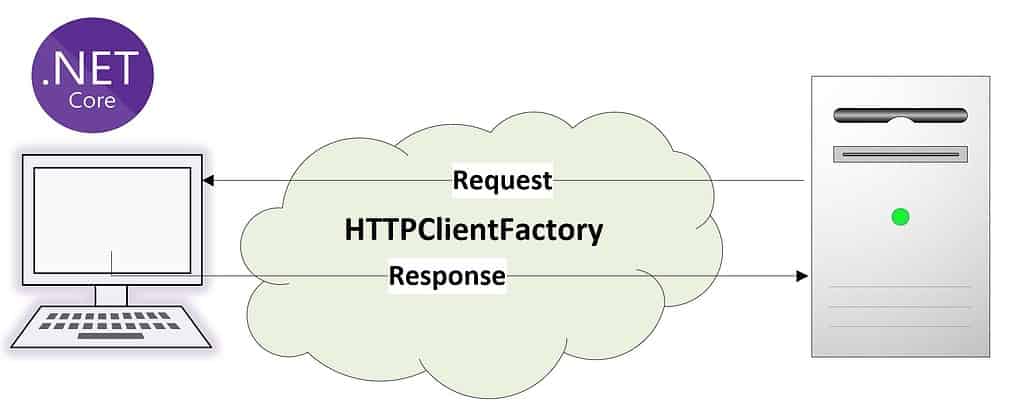Top Benefits of HttpClientFactory in .NET

Today in this article, we will cover the top 10 benefits of HttpClientFactory.
The HttpClientFactory is a feature provided by the .NET framework that offers several benefits for managing and using HttpClient instances in your application.
HttpClientFactory provides a more efficient and flexible approach to managing HttpClient instances in your applications. It improves performance, scalability, configuration management, and testability, and promotes good architectural practices such as separation of concerns and dependency injection.
Benefits of HTTPClientFactory
Improved Performance
The HttpClientFactory manages the lifetime of HttpClient instances for you. Instead of creating a new HttpClient every time you need to make an HTTP request, the factory reuses existing instances, which can improve performance by reducing the overhead of creating and disposing of HttpClient objects. Reusing connections and handlers also helps in managing resources effectively.
Resource Efficiency
Creating and disposing HttpClient of instances can be expensive due to the underlying TCP connection management.
HttpClientFactory helps manage the lifecycle of HttpClient instances, reusing and pooling them, which improves resource utilization and performance.
It eliminates the need to create a new HttpClient one for every request.
It allows you to reuse existing connections, reducing the overhead of establishing new connections.
Efficient Connection Pooling
The HttpClientFactory utilizes connection pooling behind the scenes.
It allows multiple requests to share a single underlying TCP connection, reducing the overhead of establishing new connections for each request.
Connection pooling improves efficiency
Connection pooling reduces the latency of subsequent requests.
Automatic Retry and Circuit Breaker Policies
HttpClientFactory allows you to configure retry and circuit breaker policies easily.
You can define rules to automatically retry failed requests based on criteria such as status codes, exceptions, or transient failures.
Circuit breaker policies help prevent cascading failures by temporarily stopping requests to a failing service and providing fallback responses.
Configuration Centralization
HttpClientFactory integrates well with configuration systems and dependency injection frameworks.
It works very well and lets you centralize the configuration and instantiation of HTTPClient objects.
- For example, a client named Account could be registered and configured with specific security to only access the Account details and another HttpClient object can use their own security schemes and configuration.
You can define and configure named HttpClient instances in your application’s configuration files or code, which allows for easy management and swapping of HTTP client configurations across different environments (e.g., development, staging, production).
Dependency injection frameworks can inject HttpClient instances into your application’s services without manual instantiation.
Integration with Dependency Injection
HttpClientFactory integrates well with dependency injection frameworks like ASP.NET Core’s built-in DI container.
It can be registered as a service, allowing you to inject and use HttpClient instances wherever they are needed in your application.
This promotes better testability, and maintainability, and allows for better management of the HttpClient lifecycle within the dependency injection container.
Logging and Instrumentation
HttpClientFactory provides integration with logging frameworks, allowing you to capture detailed logs of HTTP requests and responses.
You can easily enable logging for HttpClient instances and customize the log output.
This helps in troubleshooting, monitoring, and performance analysis of your application’s HTTP interactions.
Extensibility and Customization
HttpClientFactory provides extension points for customization.
This extensibility enables features such as authentication, request/response transformation, caching, and more.
Example :
You can configure message handlers, which allow you to modify or intercept HTTP requests and responses.
Enable customization of HTTP objects to address specific needs like passing Security Token, NetworkCredentials, specific headers like correlation Ids or other metadata, etc.
Provides more control with Delegating handlers. Provides extensions for Polly-based middleware.
Testability
HttpClientFactory enhances testability by allowing you to replace the actual HttpClient with mock or fake implementations.
This enables unit testing of your application’s HTTP-dependent code without making actual network calls.
The ability to replace the HttpClient simplifies testing and reduces external dependencies.
HttpClientFactory can be used using any of the below techniques,
Summary
HttpClientFactory feature in .NET simplifies and optimizes the management of HttpClient instances improves performance through connection pooling facilitates configuration and dependency injection, and enhances testability.
These benefits contribute to more efficient and maintainable HTTP client usage in your applications and promote good architectural practices such as separation of concerns and dependency injection.
For More details – HTTPClient -Best Practices and Guidelines
Do you have any comments or ideas or any better suggestions to share?
Please sound off your comments below.
Happy Coding !!
Please bookmark this page and share it with your friends. Please Subscribe to the blog to receive notifications on freshly published(2024) best practices and guidelines for software design and development.
